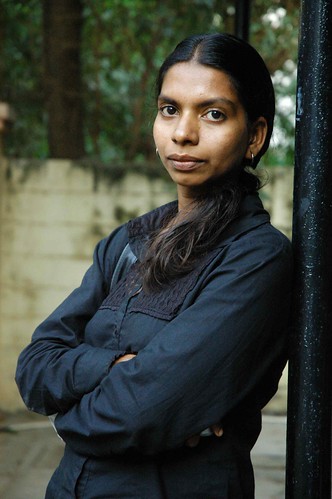Weaving the Body with Words
March 1, 2006
Kutti Revathi discusses her fraught position as a Tamil woman poet in a male-dominated literary tradition, and her view of poetry as a protest against “the silence into which the female body has been coerced”.
In conversation with N. Kalyan Raman.
NKR: For over fifty years since its founding in the 1930s, the tradition of ‘modern poetry’ in Tamil - ‘pudhukkavidhai’ - has been shaped and sustained exclusively by male poets. With this background, could you say something about choosing poetry as your mode of creative expression, and about the struggle to create a new and hitherto unexplored space for women in the arena of modern Tamil poetry?
KR: My first collection of poems, Poonaiyai pola alaiyum velicham (Light prowls like a cat), was a fortuitous effort; it was not planned consciously. Going to college to study for a degree in Siddha medicine was a very imporant milestone in my life. The underlying principles of Siddha medicine are all written in verse form. It was due to my passion for the language that I, who had joined college to study law, left to take up the study of Siddha medicine. Richness of language, diction, tone, style and form — for all these and more, the verses of Siddha medicine are a rare treasure of the Tamil language. I can feel the gifts from this body of work – robustness of language and fertility of ideas – still churning inside me. I wrote those early poems, one by one, out of my sheer love of poetry; and later, I compiled them into the collection, Light prowls like a cat. That first collection of mine, with its particular images, created a minor uproar in the Tamil literary milieu.
Words are like miraculous feats, really. Poetry, though it remains a frozen form, shapes language with emotion and at the same time, hones emotion through language. Moreover, unlike a novel or short story, a poem does not begin to disclose its meaning in just one reading. A poem takes a long time even to enter the mind; and in the same fashion, to leave it. As it languishes on the mindscape, a poem reveals itself, image by image, as a powerful tableau of emotions. Further, any word that emerges from a poet’s mind comes forth with the imprint of the poet’s blood. It is possible to say more, much more, about how poetry happens and works.
My reading of world literature in the interval between my first collection and the second, Mulaigal (Breasts), was truly wide-ranging. One by one, I read most of what are considered enduring classics of world literature, giving my mind and body over to the chemical changes they seemingly wrought in me. That would be one way to describe my journey. A man forges his early creative work from the expanse of his imagination and from the world of abstractions traversed by his mind. In contrast, a woman, I believe, mines the boarded-up space that is her body for words and offers them to the world. As a means of protesting the silence into which it has been coerced, the female body keeps imprinting on itself all the seasonal changes being wrought continuously by Nature.
NKR: Which of the following contributed significantly to your arriving at the language of your poetry and its thematic expanse:
– The tradition of women poets in Tamil, dating back to the classical Sangam period and beyond
– The inception and growth of the ‘modern poetry’ movement in Tamil and the new possibilities it has established for poetry over the past sixty years
– The feminist movement and its discourse related to the female body
– The works of western women poets in the latter half of the twentieth century – Sylvia Plath, Adrienne Rich, Anna Akhmatova, Gwendolyn Brooks, Maya Angelou (to name just a few)
– In general, the achievements, setbacks, aspriations and struggles of Tamil society
KR: I look upon all the factors you have cited as ancillary. I believe strongly that giving oneself over fully to life’s experiences and subjecting it to keen and relentless observation are what gives a person the language for poetry and a fertile expanse of ideas. However much one may be impacted by knoweldge of world literature, the Tamil poetry tradition or by one’s acquaintance with the discourses of feminism, poetry in its entirety demands an endless enquiry into the self, and endless cycles of the self’s destruction and renewal. In particular, it is vitally important not to distance oneself from life’s struggles. Travelling to distant places and meeting different people are equally important. I believe that so long as you remain a poet, you must make yourself heir seemingly to several hundred strands of feeling and more; that you must observe keenly the tremors these emotions set off inside you. There are still many landscapes and realms of experience that women are yet to traverse; and many mindscapes that they never could.
NKR: “Poetry makes nothing happen,” said the famous poet, Auden. In some sense, this is true enough. Do you see the disturbances set off by some of your poems as a societal ‘event’, necessarily? How do you make sense to yourself of these ‘protests’ and ‘condemnations’?
KR: That “poetry makes nothing happen” can only stem from an objective, materialist conception of the world. The evolution of modern poetry as a form to be read in silence must imply that it is a form strongly capable of engendering subjective epiphanies. Modern women poets write poetry imbued with the capability of producing inner tremors. These tremors can be made sense of in various ways. To minds seeking liberation, they could connote the joy of freedom. Minds sufffering under oppression could perceive them as fantasies about the space they have yearned to traverse but could not so far. People always ask my why I do not write poems about societal concerns and issues, as though attempts to bring about inner renewal and inner transformation were not acts of social concern. I use my language only to loosen the fetters that have bound and shrunk a woman’s body. I have experienced poetry enter the beings of women in much the same way as performing arts do.
NKR: The ongoing ‘controversy’ about your poems (and those of other woman poets in Tamil) are largely based on male response to certain aspects of these poems which touch upon the female body. The debate revolves entirely on this axis. It is rather strange that the response of women readers to these poems about the female experience is not spoken of at all, and therefore, it largely unknown to the general community. Have women shared with you their response to your poems? Do you think it is a political strategy to exclude their response – even references to it, let alone exposure – from the current debate?
KR: This question makes me reflect deeply on the issue. To ignore women’s responses and to suppress expressions of their minds are not new to the Tamil tradition. A woman is always considered to belong to the third – and lowest – category of human beings. Because women’s reactions and ideas are suppressed in our society, they fail to evolve into a robust discourse. Even today, the debate continues to be based solely on western feminism, with the intellectuals in Tamil Nadu making a continued efffort to assimilate its ideas. Even ideas on sex are perceived from the vantage of western feminism. But the politics of women’s bodies in Tamil Nadu is unique in itself. Therefore, ‘Tamil feminism’ must formulate itself, taking into account Tamil culture, and the nature of women’s existence in a Tamil Nadu which is no more than a unit enjoying the benefits of the Indian republic’s larger political arena. Further, there is a need for continuous exchange of ideas on Tamil feminism between women writers in Tamil, on the one hand, and the community of intellectuals and academics in Tamil Nadu, on the other. And there must be an integrity to this exchange. Women readers shake the dormant images in my poems into wakefulness through their sustained effort and joyfully share this experience with me. Even the act of denying women’s responses an active existence in society is nothing but a cunning ploy of patriarchal society to conquer and defeat the ability of women to think and act.
December, 2005, previously unpublished.





